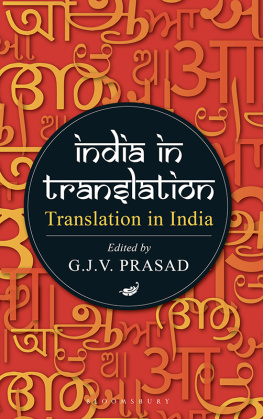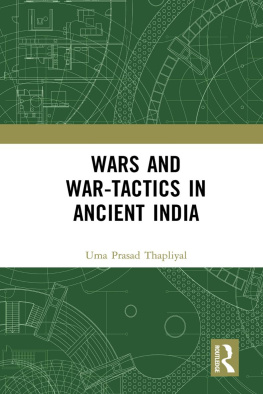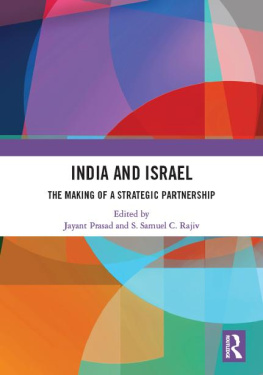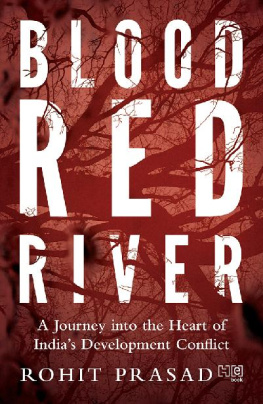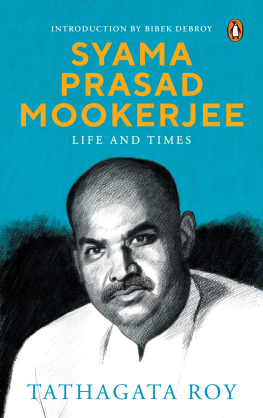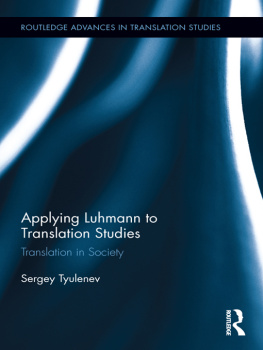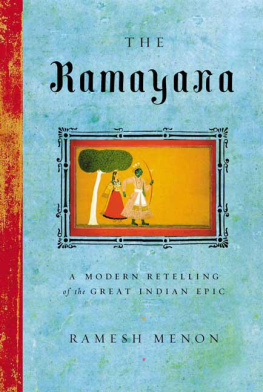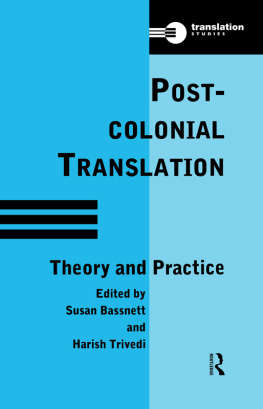G.J.V. Prasad - India in Translation, Translation in India
Here you can read online G.J.V. Prasad - India in Translation, Translation in India full text of the book (entire story) in english for free. Download pdf and epub, get meaning, cover and reviews about this ebook. year: 2019, publisher: Bloomsbury India, genre: Politics. Description of the work, (preface) as well as reviews are available. Best literature library LitArk.com created for fans of good reading and offers a wide selection of genres:
Romance novel
Science fiction
Adventure
Detective
Science
History
Home and family
Prose
Art
Politics
Computer
Non-fiction
Religion
Business
Children
Humor
Choose a favorite category and find really read worthwhile books. Enjoy immersion in the world of imagination, feel the emotions of the characters or learn something new for yourself, make an fascinating discovery.
- Book:India in Translation, Translation in India
- Author:
- Publisher:Bloomsbury India
- Genre:
- Year:2019
- Rating:5 / 5
- Favourites:Add to favourites
- Your mark:
- 100
- 1
- 2
- 3
- 4
- 5
India in Translation, Translation in India: summary, description and annotation
We offer to read an annotation, description, summary or preface (depends on what the author of the book "India in Translation, Translation in India" wrote himself). If you haven't found the necessary information about the book — write in the comments, we will try to find it.
India in Translation, Translation in India — read online for free the complete book (whole text) full work
Below is the text of the book, divided by pages. System saving the place of the last page read, allows you to conveniently read the book "India in Translation, Translation in India" online for free, without having to search again every time where you left off. Put a bookmark, and you can go to the page where you finished reading at any time.
Font size:
Interval:
Bookmark:

India in
Translation,
Translation in
India
India in
Translation,
Translation in
India
Edited by
G.J.V. Prasad

BLOOMSBURY INDIA
Bloomsbury Publishing India Pvt. Ltd
Second Floor, LSC Building No. 4, DDA Complex, Pocket C 6 & 7,
Vasant Kunj New Delhi 110070
BLOOMSBURY, BLOOMSBURY ACADEMIC INDIA and the Diana logo are trademarks of
Bloomsbury Publishing Plc
First published in India 2019
This edition published 2019
Copyright G.J.V. Prasad, 2019
G.J.V. Prasad has asserted his right under the Indian Copyright Act to be identified as Author of this work
Bloomsbury Academic
An imprint of Bloomsbury Publishing Plc
All rights reserved. No part of this publication may be reproduced or transmitted in any form or by any means, electronic or mechanical, including photocopying, recording, or any information storage or retrieval system, without prior permission in writing from the publishers
Bloomsbury Publishing Plc does not have any control over, or responsibility for, any third-party websites referred to or in this book. All internet addresses given in this book were correct at the time of going to press. The author and publisher regret any inconvenience caused if addresses have changed or sites have ceased to exist, but can accept no responsibility for any such changes
ISBN: HB: 978-9-3884-1419-7; eBook: 978-9-3884-1421-0
2 4 6 8 10 9 7 5 3 1
Created by Manipal Digital
Bloomsbury Publishing Plc makes every effort to ensure that the papers used in the manufacture of our books are natural, recyclable products made from wood grown in well-managed forests. Our manufacturing processes conform to the environmental regulations of the country of origin
To find out more about our authors and books visit www.bloomsbury.com and sign up for our newsletters
For
the translators of my life,
Kamala and Shubha
Contents
I must acknowledge the help I have received from my colleagues at the Centre for English Studies, and thank them for the DSA funds made available under the Special Assistance Programme of the UGC, and to the Research Fellows Rupali and Fuzail A. Siddiqi for their unstinting support. I must thank Fuzail specifically for his great help in putting this book together.
India is a nation of translations. India is not a name given by Indians to India, nor did the majority of the population call themselves Hindu. These are the names given by others, names in other languages that they used to speak of people who lived on the banks of the river Sindhu, called Indus by the outsiders. One can see that the name India is derived from the river Indus. The river was called Hindu in Old Persian, derived from the Sanskrit word Sindhu. The Hindus were people who lived near the Indus. Herodotus, the so-called father of history, was perhaps the first one to call the people Indians. Thus, what the country is called today is because of how the name of a river was translated in other languages and how this translation was used further to refer to the people and a community. This naming is a political issue even today, since other countries in the subcontinent may ask what India refers to. This was a question raised during the partitionPakistan had been a part of India, but India was not an independent nation then. After independence, shouldnt the name India be used for the pre-independent subcontinent? Shouldnt the two new nations be given different names? Obviously, Indian politicians thought otherwise, most of them did not even support the creation of Pakistan. However, while India would ensure the breakaway status of Pakistan, wouldnt it actually make the country an invention of the British? Shouldnt the nation take a name that would refer to our civilisational past? The Constitution has visible traces of such a debate.
Having proudly declared in the preamble to the Constitution of India on 26 November 1949 that, WE, THE PEOPLE OF INDIA, having solemnly resolved to constitute India into a [SOVEREIGN SOCIALIST SECULAR DEMOCRATIC REPUBLIC] and to secure to all its citizens: JUSTICE, LIBERTY and EQUALITY, the members of the constituent assembly went on to say in Part I of the Constitution, which delineates the Union and its Territories, that India, that is Bharat, shall be a Union of States. (1.1)
The Constitution of India thus immediately points attention to the problematic issue of naming, that is, the translationIndia, that is Bharat. We the people of India are also we the people of Bharat. Why did the constitution makers do this? Did they think of our country as India or Bharat or both? Were these two names interchangeable? What about Hindustan? After all, Hindustan was also a name that was used for India for a very long time. Was India the nation in English, and Bharat the desh, the native land, in Indian languages? Or was it going to be Bharat in Hindi? Did it also signal a contestation between languages, a hierarchy of languagesIndia, that is Bharat rather than Bharat, that is India?
The answer to some questions is simplethe members of the constituent assembly thought of themselves belonging to both Bharat and India. Suggestions were made during the debate on this (17 September 1949) that instead of saying India, that is Bharat, the constitution should read, Bharat, or, in the English language, India, or Bharat, that is known as India also in foreign countries or simply as Bharat, that is India. One of the members went so far as to say that it should only be called Bharatvarsha. But interestingly, none of them suggested Hindustan, a name they used frequently in their own speeches in the Constituent Assembly. So why Bharat and not Hindustan? There could be conflicting reasons for this choice, one that Hindustan had been appropriated by the Hindu right-wing as the name of the land of Hindus and the other is that Hindustan was the name by which the Mughal North India was known and that Hindustan never really indicated the entire subcontinent. So, on the one hand, Hindustan was associated with the Muslim rule while on the other, Hindustan had been appropriated by the North Indian Hindu right-wing in the slogan, Hindi, Hindu, Hindustan.
Thus, to move from Hindustan to Bharat was to move to pre-Muslim rule times, to the previous millennium. As put by one of the members of the assembly, Kamalapati Tripathi,
When a country is in bondage, it loses its soul. During its slavery for one thousand years, our country too lost its everything. We lost our culture, we lost our history, we lost our prestige, we lost our humanity, we lost our self-respect, we lost our soul and indeed we lost our form and name. Today after remaining in bondage for a thousand years, this free country will regain its name and we do hope that after regaining its lost name it will regain its inner consciousness and external form and will begin to act under the inspiration of its soul which had been so far in a sort of sleep. It will indeed regain its prestige in the world.
So, India had to shift back through time, from India, from Hindustan, to Bharat, a conceptual space which has existed in scriptures and in the Hindu imagination for a long time and was part of the cultural consciousness of the majority. Hence, India, that is Bharat. Ironically, the constitution never refers to the country as Bharat anywhere else!
Interestingly, on 11 March 2016, the Supreme Court of India dismissed a petition to rename India as Bharata. If you want to call this country Bharat, go right ahead and call it Bharat. If somebody else wants to call this country India, let him call it India. We will not interfere, said the Chief Justice of India T.S. Thakur (
Font size:
Interval:
Bookmark:
Similar books «India in Translation, Translation in India»
Look at similar books to India in Translation, Translation in India. We have selected literature similar in name and meaning in the hope of providing readers with more options to find new, interesting, not yet read works.
Discussion, reviews of the book India in Translation, Translation in India and just readers' own opinions. Leave your comments, write what you think about the work, its meaning or the main characters. Specify what exactly you liked and what you didn't like, and why you think so.

